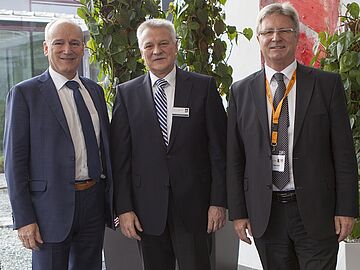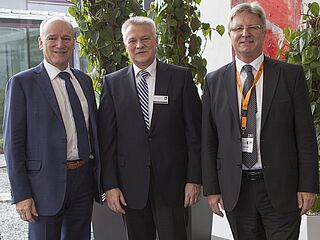MES-D.A.CH association event with B&R
For two days at the end of January in Eggelsberg, Upper Austria, everything will revolve around Manufacturing Execution Systems (MES). B&R was the host of the second event "Focusing on MES" from the multi-regional MES-D.A.CH association (http://www.mes-dach.de). The 80 participants were in particular agreement on one point: production lines must be able to communicate with each other factory-wide and respond to product-related process changes in real time. Only then does profitable production, which allows product customization all the way down to batch size 1, become possible. Some time will pass, however, before a workpiece makes its way through production on its own, as predicted by the vision for Industry 4.0.
The boundaries of the automation pyramid are dissolving
Peter Gucher – General Manager at B&R – noted in his introductory statement that further optimization of production processes are for the most part only possible using intelligent software. Energy management and the cooperation of robots and humans are also important topics related to process optimization. His prediction is that the automation pyramid will dissolve: "In the future, there will be a cloud of features that are utilized depending on the requirements. Hierarchies will no longer exist."
Prof. Jürgen Kletti – Association Chairman – states that the ERP system would experience an information overload without MES. An MES has the task of compressing and consolidating data and handling detailed production planning. "To increase productivity, setup and maintenance times should be greatly reduced and outages and downtime should be minimized." The challenge now is to implement the theoretical concept of Industry 4.0 in practical applications.
Plug-and-play for industrial machinery
A major obstacle in the implementation of MES solutions is communication. The MES-D.A.CH association therefore supports UMCM (Universal Machine Connectivity for MES) for the most important machine data. "The ideal solution is something like plug-and-play for industrial machinery," says Kletti. The MES should be used as a data hub that can be used so that machines can communicate with each other.
Herbert Parnreiter from Industrie Informatik GmbH in Linz pointed out that, for many companies, too much effort is required to implement an MES solution and too little budget is available to do so. When implementing an MES solution, benefits must be quickly recognizable and productivity must increase significantly. This could be implemented easily with several small projects.
During a plant tour, participants had a chance to experience production at B&R firsthand. They were impressed by how advanced the implementation of factory-wide Industry 4.0 strategies really are at B&R.

